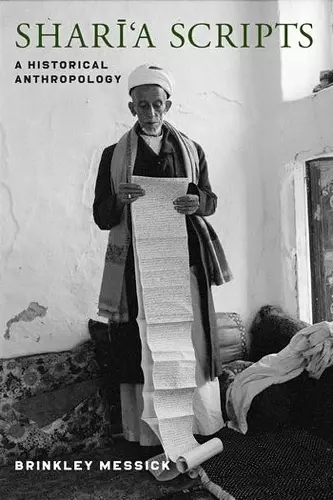Shari'a Scripts
A Historical Anthropology
Format:Paperback
Publisher:Columbia University Press
Published:12th Apr '22
Should be back in stock very soon

A case study in the textual architecture of the venerable legal and ethical tradition at the center of the Islamic experience, Sharīʿa Scripts is a work of historical anthropology focused on Yemen in the early twentieth century. There—while colonial regimes, late Ottoman reformers, and early nationalists wrought decisive changes to the legal status of the sharīʿa, significantly narrowing its sphere of relevance—the Zaydī school of jurisprudence, rooted in highland Yemen for a millennium, still held sway.
Brinkley Messick uses the richly varied writings of the Yemeni past to offer a uniquely comprehensive view of the sharīʿa as a localized and lived phenomenon. Sharīʿa Scripts reads a wide spectrum of sources in search of a new historical-anthropological perspective on Islamic textual relations. Messick analyzes the sharīʿa as a local system of texts, distinguishing between theoretical or doctrinal juridical texts (or the “library”) and those produced by the sharīʿa courts and notarial writers (termed the “archive”). Attending to textual form, he closely examines representative books of madrasa instruction; formal opinion-giving by muftis and imams; the structure of court judgments; and the drafting of contracts. Messick’s intensive readings of texts are supplemented by retrospective ethnography and oral history based on extensive field research. Further, the book ventures a major methodological contribution by confronting anthropology’s longstanding reliance upon the observational and the colloquial. Presenting a new understanding of Islamic legal history, Sharīʿa Scripts is a groundbreaking examination of the interpretative range and historical insights offered by the anthropologist as reader.
A detailed study of the production, transmission, and transformation of scriptural judicial knowledge among Yemeni scholars, judges, and other legal figures. -- Maurits S., Berger Leiden University * Journal of the American Oriental Society *
Skillfully recovers the practice of Shari'a law in the highlands of prerevolutionary Yemen. * Choice *
Turns on its head a long history of assumptions regarding categories that have largely remained unquestioned. * Reading Religion *
A complex and sophisticated book, one that provides important insights into Islamic jurisprudence and legal practice and forces the reader to think carefully about how these might (or should) be understood and explored. * Islamic Law and Society *
In this monumental work, Brinkley Messick presents a richly detailed explication of a ground-breaking approach to the study of the textual traditions of shari'a, combining nuanced ethnography of locally contextualized practices of writing
and reading with a sharp critical engagement with the work of philologists and historians of Islamic law and society. * Journal of Islamic Studies *
This book is an outstanding achievement that takes the historical and anthropological dimensions of shar¯ıʻa practice seriously * Journal of the Royal Anthropological Institute *
Sharīʿa Scripts explores debates within an Islamic legal tradition about the status of writing and thus of recorded truth. This is an impressive piece of work that draws upon the author’s four decades of thought and reading. No one else can move among these Yemeni texts with such assurance, and classic works such as Kitāb al-azhār, Sharḥ al-azhār, and Sayl al-jarrār are read more closely than any Western academic has attempted previously. A formative and distinguished book. -- Paul Dresch, St John's College, Oxford
Multicentury approaches of the sharīʿa have regrettably transformed law into a banal history of ideas without much connection to practice. Messick’s Sharīʿa Scripts instead takes the sharīʿa right from the economy of the local, that of central Yemen, and places research at a micro level. Historical anthropology makes possible the tracing of genealogical lines of power relations, and the depiction of narratives and discourses in relation to local practices. This book, which takes the logic of texts and their practices to new heights, stands out as a masterful contribution to sharīʿa studies worldwide. -- Zouhair Ghazzal, Loyola University, Chicago
What would be an anthropology of an Islamic juridical tradition? Anthropology aims to describe the whole as lived. Hence the ambition is larger than the historical genealogies or analytical interpretation of textual scholarship. This book examines both the structure of the jurisprudential ‘library,’ using the techniques of textual scholarship, and the ‘archive’ of day-to-day documentation of life in law, situating documents in the practices of writing and orality. Such an undertaking is virtually unique: the late survival of scriptural practice, the living interface of Zaydī and Shāfiʿī traditions, and the political centrality of Islamic jurisprudence made never-colonized highland Yemen of the mid-twentieth century a unique site for such an anthropology. The result is a mature work that quietly destroys clichés ever reproduced not only by journalism (and political revivalist movements) but also by textual scholarship. There cannot be another like it. -- Martha Mundy, London School of Economics
Sharīʿa Scripts is a work of tremendous erudition and imagination that provides a veritable roadmap for a new anthropology of Islamic law. It is bound to become required reading for scholars, students and the general public interested in understanding the inner workings of legal praxis in an authentic Muslim society. * Cahiers de'etudes africaines *
ISBN: 9780231178754
Dimensions: unknown
Weight: unknown
536 pages